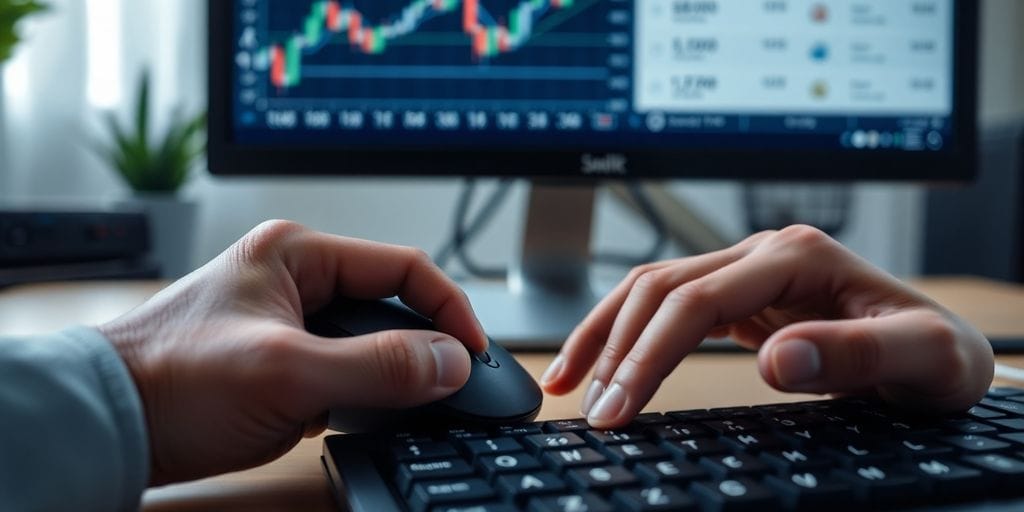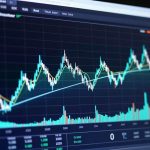Picking the right trade future broker is a big deal if you’re serious about your money. It’s not just about finding any platform; it’s about finding one that fits how you like to trade. With so many choices out there, it can feel a bit much to sort through them all. This article will walk you through what really matters when you’re trying to pick the best trade future broker for you.
Key Takeaways
- Look for a trade future broker with a solid platform that has all the tools you need for charting and analysis.
- Make sure your trade future broker offers good support and has people who know a lot about futures.
- Always check the fees your trade future broker charges so you know what you’re paying for.
- A good trade future broker will have real-time data and quotes to help you make quick decisions.
- Pick a trade future broker that is regulated and keeps your money safe.
Evaluating a Trade Future Broker

Choosing a futures broker is a big deal, especially if you’re serious about trading futures. It’s not just about picking the first one you see. You need to really look at what they offer and how it fits with what you need.
Full-Featured Trading Platform
Back in the day, futures trading was all about shouting in a pit. Now? It’s mostly online. That means a good trading platform is super important. You want something that lets you do your research, tweak things to your liking, make trades without a hassle, and keep an eye on the market. Fast price updates, the latest news, solid research, and all the data you could want are things to look for.
Futures Expertise and Support
Everyone starts somewhere, and even experienced traders need a little help sometimes. A good broker should have plenty of learning materials. Think articles, videos, and other stuff that can help you get better.
Understanding Brokerage Fees
Fees matter. You want a broker with clear pricing, whether you’re doing it yourself or getting help from a broker. Don’t just go for the cheapest option. Think about what you’re getting for your money. Is the support good? Is the trading platform top-notch? Does the broker know their stuff?
Picking the right broker can really make or break your trading game. This is especially true with futures trading, where things can get wild and a bad platform can cost you big time.
Key Features of Top Trade Future Brokers
There are some things that all successful futures traders have in common, and picking the right broker is definitely one of them. You need a brokerage that has the right mix of tech, service, and features if you want to get the most out of your trades. If you haven’t been trading for long, or you’ve been with the same broker forever, figuring out what makes a platform good can be tough. Let’s break down the most important things to look for when you’re picking a futures broker.
Full-Featured Trading Platform
Technology has totally changed how financial markets work. Not that long ago, all futures trades happened in person, inside an exchange. Now, those shouting traders seem like something from the past. Trading has mostly moved online. That means having a trading platform that does everything you need is almost a must. The right broker gives you the digital tools to easily research, customize, make trades, and watch the market. You’ll want fast price updates, the latest news, good research, and all the data you need to make smart trades.
Futures Expertise and Support
Traders have all sorts of different levels of experience, so brokerages should be ready for that. Good brokerages should have lots of educational stuff for you to check out. Articles, training videos, and other things are great if you’re just starting out. It’s good to have access to resources that can help you learn and grow as a trader.
Real-Time Data and Quotes
Having real-time data and quotes is super important. You need to know what’s happening in the market right now, not a few seconds ago. This helps you make quick decisions and not miss out on opportunities. Look for a broker that gives you fast, reliable data feeds. This can really make a difference in how well you trade.
Advanced Charting and Analysis Tools
Advanced charting and analysis tools are a must-have for any serious futures trader. These tools let you see patterns, trends, and potential entry and exit points. Look for a platform that has lots of different indicators, drawing tools, and customization options. The better your charts, the better you can understand the market.
Robust Trading Technology
Robust trading technology is also a key feature. You want a platform that’s fast, reliable, and doesn’t crash. Nothing’s worse than trying to make a trade and the platform freezes up. Make sure the broker uses good technology that can handle lots of data and trades at the same time. This will help you trade with confidence.
Choosing the right broker and platform can really decide whether you succeed or fail in investing. This is especially true for futures trading, where things can change fast, and a bad platform can cost you a lot of money.
Understanding Brokerage Fees
How fees work is also important. Whether you’re trading on your own or with help from a broker, find a firm that’s clear about its pricing and has been around for a while. The cheapest option isn’t always the best. You need to think about what you’re getting for the money, like support, access to good platforms, and the broker’s knowledge.
Choosing the Right Platform for Your Strategy
Selecting the correct trading platform is a big deal. It’s not just about pretty charts; it’s about finding a space where your trading style can really shine. Different platforms cater to different needs, so let’s break down some options.
Platforms for Professional Traders
Professional traders often need advanced tools and lightning-fast execution. These platforms usually come with a steeper learning curve, but the payoff can be worth it if you’re serious about futures trading. They provide sophisticated charting, real-time data feeds, and direct market access. top online brokers are often favored by professionals.
- Advanced charting capabilities
- Direct market access
- Low latency execution
Platforms for Dedicated Futures Traders
If futures are your main game, you’ll want a platform that’s built specifically for that. These platforms typically offer specialized tools and resources tailored to futures contracts. Think of it as a workshop designed just for your craft. You’ll find features like options for futures trading platform analysis and contract rollovers.
- Specialized futures analysis tools
- Easy contract rollovers
- Margin management tools
Platforms for New Futures Traders
Starting out in futures can be intimidating. Luckily, some platforms are designed with beginners in mind. They often have simpler interfaces, educational resources, and smaller contract sizes to help you learn the ropes without risking too much. These platforms prioritize ease of use and learning. Good brokerages should have a deep reservoir of educational and training materials for your perusal. Articles, training videos and other materials are a great source of information for those who are early in the journey.
- User-friendly interface
- Educational resources and tutorials
- Smaller contract sizes available
Choosing the right platform is like finding the right pair of shoes. It needs to fit well and support you as you move forward. Take your time, explore your options, and don’t be afraid to try a few different platforms before settling on one.
Critical Considerations for Trade Future Brokers
Choosing a trade future broker isn’t just about finding the cheapest fees; it’s about finding a partner that aligns with your trading style and risk tolerance. There are a few things you really need to think about before handing over your money.
Regulation and Security
First and foremost, make sure your broker is regulated by a reputable authority. This is non-negotiable. It’s like making sure a restaurant has a health inspection certificate before you eat there. You want to know someone is watching over them. Regulation provides a layer of protection for your funds and ensures the broker adheres to certain standards. Look for brokers regulated by the CFTC (Commodity Futures Trading Commission) or similar bodies. Also, check if they offer account insurance, like SIPC, which protects your funds in case the brokerage fails. It’s also worth doing a quick search to see if they’ve had any major run-ins with regulators in the past. Better safe than sorry.
Competitive Margin Rates
Margin rates are the interest rates you pay on borrowed funds. These rates can eat into your profits, so it’s important to shop around. Don’t just look at the headline rate; consider the overall cost, including any hidden fees. Some brokers offer lower margin rates to attract new clients, but then sneak in extra charges elsewhere. It’s like when a store advertises a big sale, but then the shipping costs are outrageous. You should also understand how margin calls work and what happens if you don’t meet them. It’s not fun to have your positions liquidated because you didn’t have enough money in your account. To begin futures trading, it’s important to understand margin requirements.
Customer Support Quality
When things go wrong – and they will – you want to be able to get help quickly and easily. Test out the broker’s customer support before you commit. Call them, email them, use their chat function. See how responsive they are and how knowledgeable they are. Are they patient and helpful, or do they seem like they’re just trying to get you off the phone? A good broker should offer multiple channels of support, including phone, email, and live chat. They should also have a comprehensive FAQ section on their website.
It’s easy to overlook customer support when everything is going smoothly, but it becomes incredibly important when you need help with a trade, have a question about your account, or encounter a technical issue. A responsive and knowledgeable support team can save you time, money, and a lot of frustration.
Here’s a quick comparison of customer support options:
| Broker | Phone Support | Email Support | Live Chat | FAQ Section |
|---|---|---|---|---|
| Broker A | Yes | Yes | Yes | Yes |
| Broker B | Yes | Yes | No | Yes |
| Broker C | No | Yes | Yes | Limited |
Consider these points when evaluating customer support:
- Availability: Is support available 24/7, or only during business hours?
- Responsiveness: How quickly do they respond to inquiries?
- Knowledge: Are the support staff knowledgeable about futures trading?
- Helpfulness: Are they willing to go the extra mile to help you solve your problems?
Optimizing Your Trade Future Broker Experience
It’s not just about picking a broker; it’s about making the most of what they offer. Think of it as fine-tuning an engine – small adjustments can lead to big performance gains. Let’s explore how to really get the most out of your futures trading platform.
Access to Educational Resources
Most brokers these days provide some kind of educational content, but the quality can vary a lot. Don’t just skim through it; really dig in. Look for webinars, detailed guides, and even one-on-one coaching if it’s available. Understanding the nuances of futures contracts, margin requirements, and risk management is super important. A good broker will help you build a solid foundation. Here’s what to look for:
- Comprehensive Guides: Covering everything from basic terminology to advanced strategies.
- Interactive Webinars: Live sessions with experts where you can ask questions.
- Demo Accounts: Practice trading without risking real money.
Leveraging Account with Reduced Margin
Some brokers offer reduced margin rates for certain accounts or under specific conditions. This can free up capital and potentially increase your trading power. However, it’s a double-edged sword. While reduced margin can amplify potential profits, it also significantly increases your risk of losses. Make sure you fully understand the implications before you jump in. Consider these points:
- Understand the margin requirements for each futures contract you trade.
- Use risk management tools like stop-loss orders to limit potential losses.
- Monitor your account balance regularly to avoid margin calls.
Exploring Cutting-Edge Options
The world of futures trading is constantly evolving, with new tools and features popping up all the time. Some brokers are starting to roll out platforms with social trading features, where you can follow and even copy the trades of other successful traders. Others are experimenting with AI-powered analytics to help you identify potential opportunities. Keep an eye out for these innovations and see if they can give you an edge.
Staying informed about the latest technological advancements and market trends is key to maximizing your trading potential. Don’t be afraid to experiment with new tools and strategies, but always do your research and understand the risks involved.
Understanding Trade Future Broker Services

It’s easy to think all brokers are the same, but when it comes to futures, the services they provide can really make or break your trading experience. It’s not just about placing orders; it’s about the whole package. A good broker acts as your partner in navigating the complexities of the futures market.
Market Data Access and Execution
Having fast, reliable market data is non-negotiable. You need to see what’s happening in real-time to make informed decisions. Brokers should provide access to a range of data feeds, and their execution platforms need to be quick and efficient. Slow data or delayed order execution can cost you money. Here’s what to look for:
- Real-time quotes: No delays, period.
- Depth of market: See the order book to gauge market sentiment.
- Fast order execution: Every millisecond counts.
Market Insights and Risk Management
Beyond just data, you want insights. Does your broker offer research reports, analysis, or educational resources? Risk management tools are also critical. Look for brokers that provide features like stop-loss orders, margin monitoring, and risk analysis tools. It’s about more than just placing a trade; it’s about managing your exposure.
Choosing a broker that offers robust risk management tools is like having a safety net. It won’t guarantee profits, but it can help prevent catastrophic losses. Make sure you understand how to use these tools effectively.
Commission Structures and Value
Commissions matter, but they shouldn’t be the only factor. A broker with slightly higher commissions but better service, technology, or research might be a better value in the long run. Understand the commission structure – is it per contract, tiered, or flat-rate? Also, consider other fees, like inactivity fees or data fees. Here’s a quick comparison table:
| Broker | Commission per Contract | Data Fees | Other Fees |
|---|---|---|---|
| Broker A | $0.85 | $50/month | Inactivity fee $15/month |
| Broker B | $1.25 | Included | None |
| Broker C | $0.50 | $75/month | Wire transfer fee $25 |
Selecting a Trade Future Broker for Specific Needs
It’s not one-size-fits-all when it comes to picking a futures broker. What works wonders for a seasoned pro might be overwhelming for someone just starting out. The best broker is the one that aligns with your individual trading style, experience level, and specific needs. Let’s break down some scenarios.
Best for Desktop Trading Experience
If you’re a fan of the traditional desktop setup, you’ll want a broker that offers a robust and customizable platform. Think about these features:
- Advanced charting tools: Look for a wide array of technical indicators and drawing tools.
- Order entry options: Direct access routing is a plus for speed.
- Customizable layouts: The ability to arrange your workspace to your liking is key.
A solid desktop platform can really make a difference in your trading. It’s about having all the information you need right at your fingertips, without feeling cluttered or overwhelmed.
For example, Interactive Brokers Futures is often mentioned as a strong contender for desktop users.
Best for Futures Options Trading
Trading options on futures requires a platform with specialized tools and data. Here’s what to look for:
- Options chains: Easy access to view and analyze different strike prices and expiration dates.
- Risk analysis tools: Features that help you visualize potential profit and loss scenarios.
- Real-time quotes: Accurate and up-to-the-second pricing is crucial for options trading.
Best for Self-Directed Traders
Self-directed traders need a platform that puts them in control. This means:
- Low commissions: Every penny counts when you’re making your own decisions.
- Comprehensive research: Access to market data and analysis tools to inform your trades.
- User-friendly interface: An intuitive platform that doesn’t get in the way of your trading.
Choosing the right futures trading platforms can be a game-changer. It’s about finding the sweet spot between cost, features, and usability.
Wrapping It Up
So, picking the right broker for your trade future stuff really matters. It’s not just about finding someone, it’s about finding the right fit for how you like to invest. Think about what tools they give you, how good their customer service is, and what they charge. A good broker can make a big difference in how well you do. Take your time, look around, and pick the one that feels right for you. It’s a big decision, so don’t rush it.
Frequently Asked Questions
Why is picking a good futures broker so important?
Picking the right broker is super important for futures trading. It’s like choosing the right tools for a big project. A good broker gives you the tech, help, and features you need to do well.
What should I look for in a futures broker?
Look for a broker with a great trading platform, good support for futures trading, and clear fees. Also, make sure they have advanced charts, real-time prices, and strong technology.
Are brokerage fees important to consider?
Yes, fees are a big deal. You want a broker that’s clear about what they charge. The cheapest isn’t always best; sometimes paying a bit more gets you better tools and support.
Do brokers offer help for new traders?
Definitely! Good brokers offer lots of learning materials like articles and videos. This is super helpful, especially if you’re new to futures trading.
What kind of technology and tools should a broker have?
The best brokers have fast price updates, the latest news, good research, and all the charts and numbers you need to make smart trades. They also offer strong trading tech.
Can I share my trades with other people through a broker?
Yes, some brokers let you share your trades with others and even earn money if people follow you. This is a cool way to make extra cash if you’re good at trading.










